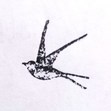Hûw Steer's Blog, page 10
April 14, 2024
The Armoured Dream
As a fantasy author, I feel it is my solemn duty to collect as many prop weapons and assorted paraphernalia as possible. Throughout my life I have succeeded in this fairly well: after a slow graduation from (but never full abandonment of) wooden swords and the like, I strode straight to the local medieval fair on the day I turned 18 and bought a sword. It currently lives at my parents’ house, having so far sliced only birthday cake. It hangs, in fact, above a full-face helmet, which is definitely too big for me but does at least go over my head, unlike the comedically tiny Roman helmet on my history bookshelf. On our windowsill sit twice as many replica flintlocks as anyone could physically hold. A spear hangs above my bookshelf. And this is to say nothing of the bits of Roman marble, ancient coins, hats and cloaks that lurk in interesting corners and in prop boxes.
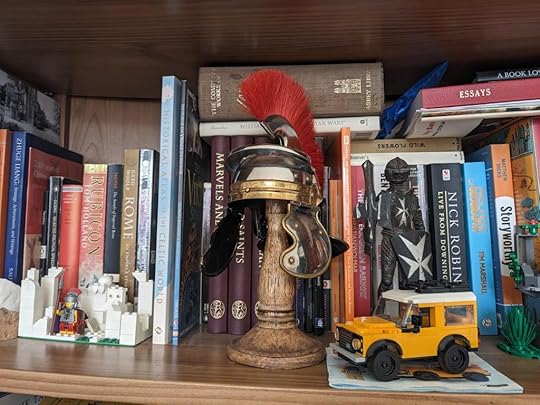 I have worn only one of these helmets to a party. You can probably guess which one.
I have worn only one of these helmets to a party. You can probably guess which one.But I’ve always wanted a suit of armour. Even though it’s impractically heavy to wear and bulky to store, even though I prefer most of my fantasy heroes to be lightly armoured and light on their feet… it’s a suit of armour. I crave endless layers of plate and mail. I desire nothing more than to clank my way around the house and probably fall through the floor from the sheer weight of metal. I want to nearly blind myself with a visored helmet and comedically walk into doorframes. (And let’s be honest, I want to pretend to be one of Adrian Tchaikovsky’s Sentinels from Ironclads et al.)
I do not have the need for a suit of armour. I do not have the space for a suit of armour. I do not have the money for a suit of armour.
Well. Not a whole one.
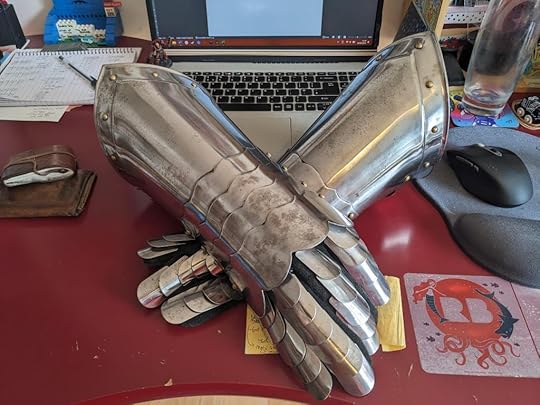
Of all the things you expect to be donated to a children’s charity toyshop – and I have found some very strange things in boxes of LEGO over the years – you don’t expect plate gauntlets. Proper, heavy, steel plate gauntlets. They’re too big for me, and I’ve got big hands. Could I justify the expense? Not really. Did I desperately need a pair of really silly gloves? Absolutely.
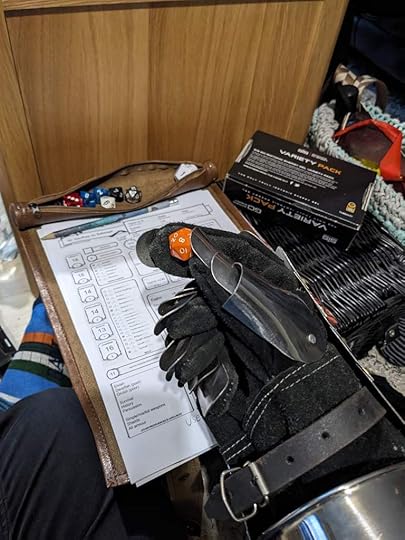 Can you roll dice in plate gauntlets? Apparently yes – I got an 18, which is better than I roll bare-handed!
Can you roll dice in plate gauntlets? Apparently yes – I got an 18, which is better than I roll bare-handed!They’re so heavy, and cumbersome, and awkward. I can barely make a fist, let alone pick stuff up without some serious concentration. They make a very useful bit of context, in fairness, as to just how awkward it can be to wear such heavy armour, something I do often find myself wondering as I write. It’s a very useful justification, too, and one that I intend to apply retroactively to some of the various other weapons and objects cluttering my house.
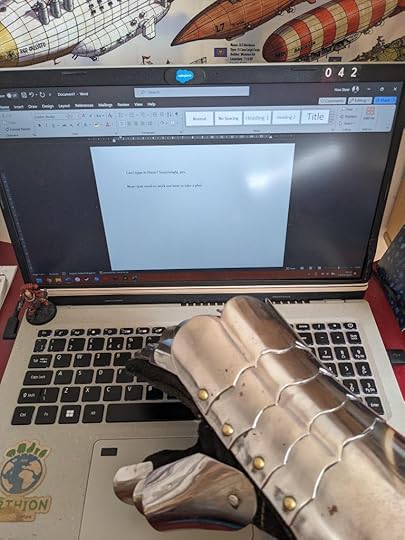
I can pretend all I like these gauntlets are for research, for all that they might actually be good for it. But really, this is just the next step in the armoured dream. I suspect that what I really want to do is live in a small and extremely eclectic museum, and honestly, I can think of worse fates.
At the end of the day, these silly gloves made me happy. And there’s nothing wrong with that.
April 13, 2024
Narratess Sale – 13th-15th April
The Narratess indie sale is once again upon us – and once again, I’m in it!
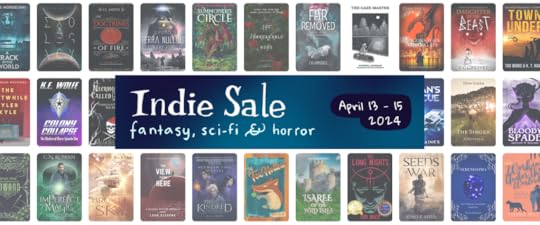
300+ free or discounted ebooks – including my own The Singer, for free – are available from today until the end of Monday. There are some absolute crackers on here, so do take a look.
And alongside this, somewhat… unofficially, The Blackbird and the Ghost and Ad Luna are also on sale for the duration!
There are good reads here. And if you’re reading this post and you haven’t read my books yet – well, now’s the time, eh?
April 7, 2024
Does What Really Happened Really Matter?
I’ve been reading non-fiction a bit lately – something I haven’t done in a good while, not properly. I dip into reference books and the like when I need to find a fact but I haven’t just gone through a chunk of history cover-to-cover in ages, and I felt like it was time. And it got me thinking about history, about sources, and about the key question of a lot of historical source analysis, namely: is any of this stuff even remotely true?
There is no history without sources – if we didn’t have actual records and evidence of the past, I would have a Masters degree in Guesswork. But of course the further back in time you go, as a general rule, the less concrete stuff you have to go on, and/or the more dubious the sources you do have become. It’s part of why I like ancient and medieval history so much more than modern history – the lack of knowledge, the act of interpreting what knowledge we have and drawing conclusions, is much more fun sometimes than just reading a verified eyewitness account of exactly what happened last Tuesday, as in modern history. (Not that modern history is immune to strategic reinterpretation and rewriting – look at every modern politician and how they like to selectively reinterpret the past to make themselves look good, even when there’s documentary evidence of the complete opposite.)
I will turn to ancient Rome because it’s always to hand in my mind (thank you, two degrees). There is a lot of surviving documentary evidence and contemporary-ish history from the period. Hooray! Except of course none of it is wholly reliable. Everything is written with an agenda, and while modern scholarship has adopted the pleasing convention of ‘setting out your argument and motivation at the start’, the ancients, as a rule, didn’t. We have vast numbers of letters from and to Cicero, which paint a stunning picture of the corruption of Republican Rome and the evils of the successive dictatorial Triumvirates. And we also have many letters to and from Julius Caesar, in which he derides the corrupt Republican Senate and speaks eloquently about the benefits of firm, decisive rule by one man (him). Who’s right? Who’s wrong? It’s all wonderfully subjective and that’s the whole point.
 A lot happened on that little brick wall. We assume we know who said what. Do we? And does it matter?
A lot happened on that little brick wall. We assume we know who said what. Do we? And does it matter?But things go even deeper when you get into ancient historians, and the way they look at even more ancient historians. There were many people who wrote clear and decisive accounts of periods in which they lived (or usually periods a bit before when they lived but they definitely, totally, were telling the truth about). Later historians refer to them as fact. Later historians refer to those historians’ ideas, and so on and so forth. Geographers, too, are culprits of this: for every actual visit to far-off lands like Egypt and largely factual account of what they were like, there were ten people who had absolutely sailed that far themselves and seen the people with no heads and three legs that they described in lurid detail. (I’m looking at you, Herodotus. Father of History my arse.) And even the good researchers would ask questions in these new lands, be told wild myths and legends and record them as absolute truth – and usually misinterpret them a bit along the way to make them a bit more spicy for their own readers. This is how we get tales of literal barnacle geese, of beast-headed men and many-headed beasts.
 Yes, geese did grow on trees in the Middle Ages. Topographia Hibernica (c. 1188) – British Library
Yes, geese did grow on trees in the Middle Ages. Topographia Hibernica (c. 1188) – British LibraryIn short, this is how we end up with fantasy. Because in these cracks between the facts, in these mad histories and made-up stories, there are wonders to behold. Adventures that never happened, kings who never ruled, battles that were never fought, gods who were never worshipped. They are talked about as absolutely true all over the place. Maybe people believed in these stories – maybe not. But they were passed down anyway. It took scholars and historians of many later generations to sort the rubbish from the fact – that’s their job, after all, and they are still, in fact, doing it. Until the invention of the time machine, they’ll always be doing it.
And some of these stories will turn out to be really useful allegories for actual real events, or politically motivated, or give some other great insight into ancient culture. And maybe those interpretations will be right – or maybe they’ll be argued, and dismissed, and cast aside as the sort of footnotes that, two thousand years from now, historians will argue over as they try to interpret our culture.
But they make for great stories, regardless. People have been seeing that for thousands of years. Since, and likely before, Lucian, for instance, who took all of what was then the modern field of history and geography, said ‘I can make up better rubbish than this,’ and did. And even in his explicitly made-up work we can find nuggets of truth and insight into the culture of his time. I did. It was an honour to do it, and to reinterpret his reinterpretations as something modern readers could enjoy too.
So the question about history doesn’t have to be ‘is this true’. It can be ‘does it matter’. And it can also be ‘how can I have fun with it?’ Because you can have a lot of fun with it, if you don’t take it too seriously.
Be it understood, then, that I am writing about things which I have neither seen nor had to do with nor learned from others – which, in fact, do not exist at all and, in the nature of things, cannot exist. Therefore my readers should on no account believe in them.
– Lucian of Samosata, The True History
March 31, 2024
Fantasy Shorts
I am ill today, so forgive something a bit rambly. But it is about writing and all that.
I had a realisation the other day. I was looking at my roster of short stories and despairing lightly, because I’ve largely run out of decent ones that are written and not yet published. On the one hand: great, I’ve got a nice stack of published stories! But I want to keep that up, which means I need more material. I’ve got a bit, though it needs a lot of editing. I’ve had a few decent SF ideas lately, too, but in the writing they sort of fizzled out. I need to go back to those and give them another go.
Fantasy, though, is a less tapped market for me in terms of short pieces. Plenty of books, yes, but only two published shorts. I think speculative fiction lends itself better to shorter forms, in fairness: you turn up with a Weird Concept, flesh it out a bit but not too much, and you’re golden. Fantasy, while still speculative, is a bit less conceptual, or at least it is when I write it. I end up focusing a bit more on characters, on how the people are interacting with an odd world rather than how the world is affecting people.
But I haven’t had any ideas for fantasy shorts in ages. I have a bunch of ideas for long fantasy pieces, but they’re going to be hefty beasts indeed. There’s only so much worldbuilding you can fit into a short story, which is why SF works better if you’re hinging everything around One Weird Thing. With fantasy you usually need to let things breathe.
Unless you’ve got a good character in your back pocket. Unless you’ve got a strong hero to work with, someone who can carry a story on their own. A character with depth, someone you’ve spent a very long time exploring. Someone who you’ve actually already been writing a bunch of short pieces for to fill in gaps – oh, I see, it’s going to be my DnD character, isn’t it. Yep, it’s Sir Geoffrey alright.
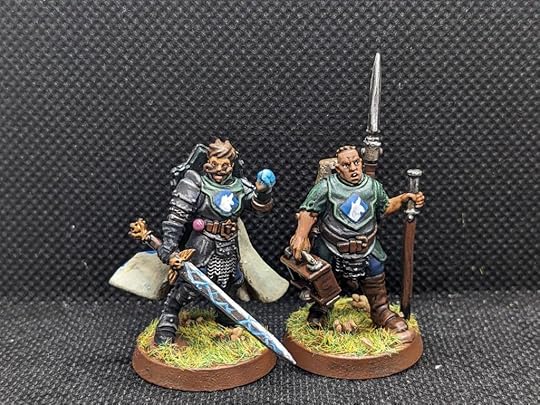 Even Hansard’s had an upgrade now!
Even Hansard’s had an upgrade now!Because I’ve been Sir Geoffrey for some time now. I know how he thinks, I know how he reacts, I know what he’ll do when I drop him into a suitably madcap situation. Even though I’m dialling back some character development and setting this/these shorts before the campaign I’ve been playing, I still know him so very well. I’ve jumped back in his timeline already to just flesh out his character on a whim and keep our DM happy. (There are few things more affirming than having such a good DM, such a good storyteller, tell you that your own storytelling is top-notch.)
And let’s be honest, Sir Geof is a fun and silly enough character to just work. Down-on-his-luck knight riding around on his manservant’s shoulders? Somewhat traumatised, arrogant coward now trying very hard to be the hero he’s always pretended to be? It’s got legs, I reckon.
If nothing else, I really enjoy writing Sir Geoffrey. So even if these stories never see the published light of day, it’ll be a good time. And at the end of the day, I’m doing this because I love it.
March 24, 2024
Names and Power
Sometimes you can get a lot out of a single word.
Or you can pack a lot into a single word, I suppose – it depends which way you’re approaching it. This is probably most evident in names, and especially in fantasy and sci-fi. When you need to append qualities to things – people, magical items, places – it always feels good to be able to get it all wrapped up in a suitable name. Maybe it’ll only reflect some qualities, maybe all of them. Maybe it’ll deliberately not reflect them. And sometimes the name or word you choose at random can end up having more meaning than you ever intended.
Let’s look at place names, and let’s look at mine. We have, in the Boiling Seas, the town of Port Malice. It’s a nice catchy name, and it has some implications. In-universe, was that always its name? (Yes.) Why name your own home something like ‘Malice’? Maybe because you’ve managed to stake a claim and scrape out a living in an inherently hostile environment, say, a boiling-hot ocean full of metal sea monsters. Maybe you call your own town ‘Malice’ out of spite and defiance at the world around you. Or maybe you’re an author only fully thinking about this name in book 3 of a trilogy, and finding serendipitous meaning in a word you picked to imply (well, basically outright state) to the reader that all is not necessarily well in this little port city.
Or Whetstone, the village where Perce lives in The Fire Within. (Or indeed Quern from The Singer, which is a type of grindstone/millstone, and definitely not hastily chosen to replace Whetstone because I forgot that I’d already used that as a town name.) A whetstone is a tool, and a tool that requires not insignificant effort to use, at that. It gives, deliberately, the impression of hard work to the reader: that the people who live in a village named for a tool are themselves going to be practical, useful, hard-working. And so the respective denizens of Whetstone and Quern are. They make their living from the land itself, two bunches of simple, practical people. Did they choose the name to fit themselves, or did the name shape them?
Names have power, after all. It’s a common trope in fantasy, to lesser and greater extents. Sometimes names have literal power over the people who have them, as in the Inheritance or Bartimaeus books – sometimes it’s more figurative, as in the classic epics like The Lord of the Rings.
When it comes to characters you often end up with titles doing the work, rather than literal names. It’s hard to take Mr Johann Goodwithasword seriously, even if he is good with a sword. But Johann of the Steel? That’s a nice succinct eponym. And the best titles, as with the best place and item names, are succinct. If you have to literally spell out that a character is the Warden of the Seven Hells, Slayer of Kings, Writer of Mediocre Love Poetry and Acceptable Gardener, it gets a bit boring. Unless, of course, you’re trying to depict an insufferable and/or arrogant bore, in which case it works rather nicely. If we look at history, you can contrast long strings of imperial Roman titles – Imperator Augustus Caesar Pontifex Maximus Romanus Eunt Domum, and all that – with the brutal simplicity of Erik the Red. I know which one of those blokes I’d rather have on my side in a scrap.
I try to tend towards the simple with my characters, though I do ignore that rule for effect. Lots of them have no titles at all; those who do develop nicknames I try to keep simple. The Blackbird, the Nightingale, all that jazz. Then you also have Sir Geoffrey du Babbage, always to be referred to by his full name by those who aren’t his friends thank you very much. But then he’s a bit of a nob, and deliberately so. But those single words can have so much more weight.
Blackbird. Quite clever, quite nimble, likes shiny things but a bit cheerier and less goth than ‘Raven’. In that case, I thought the nickname sounded cool, and worked backwards to get those traits into Tal Wenlock, its user.
And then in contrast, the sword I named last night for DnD. A magic blade, imbued with the power of a spell called Steel Wind Strike, letting the bearer strike swiftly, devastatingly and without warning. I thought this needed a name. So I did a little research, and found a hot wind, that blows down from the lee-side of a mountain to the floor below. If you’re in the lee you’re supposed to be shielded from the weather – you’re not expecting wind. And you’re certainly not expecting a warm wind to blow down from the Alps, where the word vaguely originates. A swift, unexpected wind, summarised in a single word: perfect for this Steel Wind sword.
Foehn. It’s not even a long single word. It even aspirates nicely, like the wind it describes. And to this English speaker it’s always nice to get a word with roots in another language for that extra exotic flavour.
Foehn. It’s a good sword name. I look forward to saying it. I hope that the sword ends up having as much power as the name. I reckon I can swing it.
March 17, 2024
Libraries Are Neat
It is not a controversial opinion to say that libraries are pretty great. I’d be interested to know just how large a proportion of my life I’ve spent in various libraries, shamelessly plundering the shelves of every bit of fantasy and SF I could reach – and indeed how much time I’ve spent reading those books afterwards. It’s probably an awful lot.
And the great thing about libraries versus bookshops – or at least new bookshops, stocking stuff that’s either recently released or just consistently selling well – is that there’s so much there. So many older books, so many weird, niche books, so much that you wouldn’t ever see for sale new. And sure, about half the time you find a really interesting book that’s number 3 in a series without any of the other volumes there, to great frustration – but for every book like that there’s an absolute gem you stumble across. I first found the Riftwarwhen I happened across it in the adult fantasy spinner at Ludlow Library. I picked up The Colour of Magic on a whim in another library, and then the Discworld was laid out before me. So many great series, so many wonderful books, found only because I was in a space so packed with words that the weight of them warps space.
I spend less time hanging out in libraries these days. That doesn’t mean I don’t visit them – but it’s usually a stop on a longer journey, to browse a bit and then head home. And with the convenience of my reliable* old Kindle, gone are the days when my sister and I would totter out of the library with a pile of about 14 books each to take with us on our summer holidays, to the despair of the parents who had to fit them all in our packing.
When I do go to the library, though, it’s always nice. It’s especially nice to see kids happily reading, like I used to. Just the other morning I was preceded into the library by a small fleet of children on a school visit, all eagerly learning how the book return system worked. I wonder what they’re all reading. I wonder what hidden gems they might stumble across.
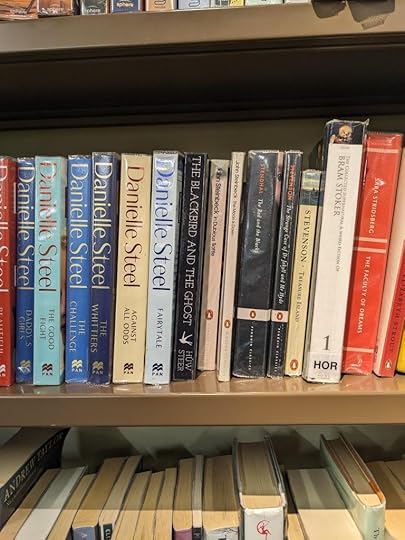 Maybe something like this.
Maybe something like this.I wonder if they’ll stumble across me. For, dear reader, I have managed to get a book into the library. No longer my local library, Archway Library in north London was nice enough to take The Blackbird and the Ghost way back in 2019 and actually shelve it. (Unlike my current local library, which, while excellent, took my books for review over a year ago and refuses to answer any of my emails.) Despite still working nearby I haven’t visited Archway Library in years, as it’s frustratingly open only when I am actually at work. But I popped by the other day. I saw Blackbird on the shelves in person for the first time. (I knew it was there from the catalogue, I just hadn’t laid eyes on it.) Tucked in next to Danielle Steel, ready to be read.
I’ve no idea if anyone has read it in the library. But they might. They might have already done it, in the last few days. Some unsuspecting person might have picked up Blackbird and gone ‘eh, worth a go.’ They might hate it. They might love it. But they’ll read it.
And they’ll be more likely to read something of mine if (and hopefully when, given the library has already taken Blackbird) they see an entire block of my books sitting there on the shelf. Islington Libraries now have my entire current corpus of books for approval, and with a bit of luck they’ll be as kind as they were 4 years ago and let a former local boy have a spot on their shelves. Budge up, John Steinbeck, Ad Luna is a bit of a brick.
It’s one library in one city. It’s not much. But all it takes is one curious reader. I’m not writing high literature, I’m not writing genre classics. But that doesn’t mean that someone, some day, won’t find the same joy in finding something I wrote on a library shelf as I have so many times before.
*Ok, so the Book of Theseus is in its third incarnation now, but given it’s a nearly 15-year-old model that’s not bad going.
March 10, 2024
Why We’re Here
Hey.
Yeah?
You ever wonder why we’re here?
The beginning.It’s been a bit of a rubbish week for me for many reasons. But the news about Rooster Teeth has really capped things off.
For those who don’t know what I’m talking about: if you’ve existed on the internet for any length of time in the last 21 years, you have, whether you know it or not, come across something from Rooster Teeth. Red vs Blue, one of the longest-running web series of all time; the vast corpus of gameplay videos from the late Achievement Hunter; animated shows like RWBY; hundreds of stupid comedy sketches, dozens of podcasts… the list goes on and on. They’ve been making dumb stuff on the internet longer than YouTube has existed, and what started as a few blokes playing Halo in someone’s front room turned into something so much bigger. It’s not been smooth sailing – there’s been bad content, there have been bad times, there have been some quite serious scandals. But Rooster Teeth has kept going, and the community that has built up over two decades of making stupid stuff has kept on supporting it.
And it got big. Jokes from AH Minecraft videos ended up in Minecraft. Red vs Blue was so popular that Microsoft added a special button prompt into Halo so that characters could lower their weapons and look more natural when filmed having conversations. The characters of RWBY appeared alongside the Justice League onscreen and on-page. Superman has shared a panel with Ruby Rose!
More than twenty years of work means there are untold thousands of hours of content up there on the internet in so many genres. And it’s all being hastily archived now by a legion of fans, because it’s entirely possible that all this stuff will just disappear in less than two months. Because Rooster Teeth is, out of nowhere, being shut down by its owners, Warner Bros. It’s just… ending, like that. Everyone working there is out of a job. Every show, every podcast, all that work, is being cut off without warning.
And that, to put it mildly, sucks.
I haven’t been there since the beginning. But I’ve been watching RT content for half my life at this point. A friend told me to watch Red vs Blue, and I did. And I loved it. And then I found the sketches, and shows like Immersion. And when Achievement Hunter started experimenting with this hip new trend of ‘Let’s Play’ videos, I watched those too. Every week brought new stuff for teenage me to watch and laugh at. Every Friday I’d log in for another compilation of people playing Halo: Reach very badly and laugh along with Jack and Geoff. By the time I went off to university RWBY had me hooked; this madcap fairytale world with its absurd fight scenes and crazy worldbuilding. It was when Monty Oum, RWBY’s mastermind, died in early 2015 that I first decided to try and write every day, a decision cemented by Terry Pratchett’s death a few months later and a streak that I’ve still kept up almost a decade on. I wouldn’t be the author I am today without the people at Rooster Teeth.
Over the years my tastes changed, as did the content RT put out; I still tuned in for RWBY and a couple of podcasts, but I had other things I’d rather have been watching. But it was still always there. I still listened to the F**ckface podcast every week – just a handful of idiots talking about nothing in particular, but for the most part that same handful of idiots I’d grown up with, watching them talk about nothing in particular, or play games badly, or make dumb jokes. It was always there. It’s always been there. When I needed a laugh, or a pick-me-up, or to relax, there was always some bit of RT, old or new, that would do the trick.
One of the greatest pieces of stupid gameplay ever produced.And soon there won’t be. And that makes me sad in a way that these words aren’t quite going to be able to convey. I didn’t expect it to last forever; nothing does; but I expected a slow decline, a graceful bowing-out as people moved on and the internet changed. And I didn’t expect it to be soon. Twenty years is a long time. But instead, all of a sudden, it’s all being ripped away. All those idiots I’ve been watching for half my life have just lost their jobs, will soon lose the rights to the things they’ve poured their own hearts and souls into. I’m worried for them. They’ve done so much for me, after all, and for so many other people.
To Warner Bros it’s just a way to claw back some cash. But something very special is being lost in the process. Something that’s been part of my life for most of it, and part of a lot of other lives too.
Nobody really knows what’s happening yet. Maybe the staff will be able to spin off their own versions of their own shows. Maybe someone will pick up the rights to the scripted content like RWBY and keep it going. Maybe the community that has grown up around Rooster Teeth over all these years will pull together and save something from the fire.
Maybe it’ll all just be gone.
I hope not. I hope that even if Rooster Teeth is dead then the people behind it can continue. I hope that the idiots I’ve grown up watching can keep being idiots for as long as they want to, and that if they want to share that stupidity with us, they can. I hope the spirit of this stupid company keeps haunting the internet and the world for a long, long time.
Now I’m going to watch two grown men laugh at people being bad at a decade-old video game. There’s nothing particularly special about this video – it’s just the one I happen to be watching next. But that’s the point. It doesn’t have to be ‘special’, it doesn’t have to be a masterpiece. It’s two people laughing and having a good time. And that’s enough.
March 3, 2024
Back to the Cutting Room Floor
Right. It’s about time I got down to editing.
A vast manuscript looms before me like a colossus in the mists, but significantly more papery. I had rather hoped that in the last couple of months, while I wrote an unrelated short story or two and worked on my RPG storylines, my mind would be filled with notions of how I could improve Boiling Seas 3. How I could cut it down, how I could rework all the meandering plot threads into something a lot more coherent, and how I could cut it down. There’s a priority here, if you hadn’t already guessed it, and it’s making the damn thing less than three-to-four times the length of The Blackbird and the Ghost.
I had hoped I’d have these ideas. Have I had any such thoughts? Have I hell. My traitor brain has instead been having ideas for completely different stories, which are far more tempting prospects to begin than returning to the existing story I have before me and tweaking it. And it is very hard to sit down and focus on editing when I have all these ideas dangling in front of me. They’re so delicious.
But as much as I hate editing, as much as I hate going back and revising what I’ve already done (my mind always rebels; didn’t I write it well enough the first time?), it is time. I said I’d give myself a couple of months and I meant it. Because the whole point is that I have time to do all this editing. I don’t have to rush it, or spend entire days at the grindstone, if I start now, doing a little bit at a time, I can chip away at the huge edifice before me.
Because I can’t just do that. I can’t just edit: I have to be creating something new, all the time. And also, practically, I normally write first thing in the morning, and while my somewhat sleepy brain is able to create it is not able to concentrate on editing and honing things to a fine standard. And thus while I start editing Boiling Seas 3 I shall also still be writing… well, a few things. I still have a short story to finish – it started with a good concept but has very much gone off the rails and needs reining into something actually decent.
And the other day I also put pen to paper (figuratively) on something that really is just for fun, with a series I haven’t touched in a long while. A scene had been in my head for a few weeks and I thought I’d just get it down, and it turned out well. Perce and Gideon have aged a day (or few) since anyone last saw them, but that just means there’s more mad magic they can do. Consulting two of my primary audience yesterday (by which I mean two of the handful of children who have actually read The Fire Within) has reassured me that someone will, in fact, read this book as and when I eventually figure out a full plot and write it down. Whether I can afford (literally) to publish more in that series is a matter for another day: for now, it’s nice to write.
So that’s going to be me for the next few months: a few wild ideas, hopefully some progress on more Perce and Gideon, and a beginning to the mammoth editing task before me. Right now, I’m optimistic. Right now, I haven’t started yet. I suspect I will feel differently this time next week…
February 25, 2024
The Littler Things – February Worldbuilding
I’ve always said that in worldbuilding it’s the little things that end up mattering most. (In fact I said it at length in the TBRCon panel I did last month, if you fancy watching that!) Small details that seem innocuous at first glance but actually show that the whole setting is turned on its head: things like the glass clothes I put in Ad Luna, or the complete lack of bees and therefore knowledge of what they sound like in a recent RPG session I ran, or many more besides. These are the markers of cognitive estrangement, the ripples that show us something much more significant is going on beneath the waves.
But even if one covers all these little things when worldbuilding, it turns out there are plenty of other aspects to cover – bits I’ve never thought about, because either they just don’t come up or because I just glossed over them in favour of the more exciting scene around the corner, or things that I have inadvertently mentioned but not consciously at all. Things like… food. What’s the cuisine of the Boiling Seas like? What are the clothing styles? Are there defined social classes? How does the government actually work? I might mention all these things but are they a proper part of the world I’ve built in my head and on paper?
I’ve been exploring a bit of this for the last month over on Twitter (never X), thanks to a great series of prompts from Erika McCorkle (Kira of the Wind), who’s been getting a fair few people to expand on all that lore bubbling away in their minds and tell us how the worlds they’ve built work.
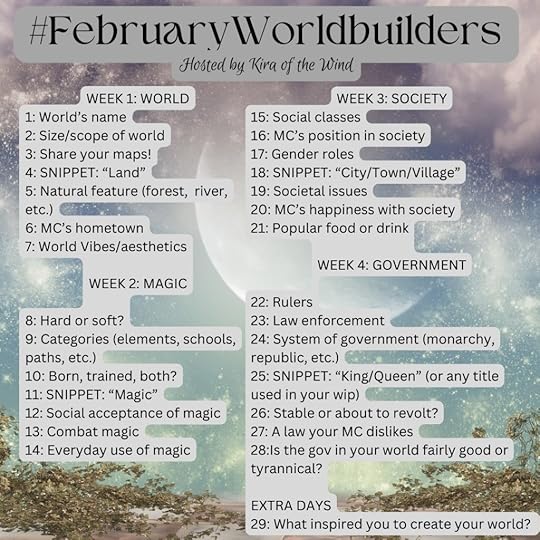 Thank you to Kira of the Wind for putting this list and image together!
Thank you to Kira of the Wind for putting this list and image together!And at first I was gleefully typing away. Natural features? Things that make your world stand out? I’ve got a whole Boiling Sea/s (I really need to pick the plural or the singular) to talk about there! Turns out when you base a whole series around (and name it after) a quirk of the world then that’s easy to wax lyrical about. Magic, too, was satisfying: I take great delight in coming up with weird uses for a relatively simple and soft magic system, hence how I’ve invented the radio, plumbing and a bunch of other things I won’t spoil yet.
And then we got to ‘society’, and I realised where the holes in m world were. Because Tal, Max and Lily don’t exactly spend much time in ‘society’, because they’re dashing off into the jungle to search for ancient treasures at every chance they get. It took a long time for me to skim through my own damn writing to find that yes, I’ve mentioned bits of hereditary nobility, that I’ve hinted at an implicit class system without ever consciously planning it out. Thankfully I seem to have remained consistent, or at least vague enough that if I ever do codify the precise social dynamics of the Seas then I can make it work. And food and drink! Obviously everyone eats, obviously everyone drinks, but what? Apart from a few scenes in fancy restaurants I don’t think I’ve ever really specified what Boiling Seas cuisine is like. But are those restaurants representative, or are they outliers? What’s street food like? I might have actually written it in a forgotten scene and just not found it.
Now we’re back on firmer ground with systems of government, as I have a convenient tyrant sitting waiting in the wings. But this series has done its work magnificently. Not only am I sharing digestible details with you lot on the internet, but I’m finding details that I didn’t even know I had about my own world. There are all sorts of extra little aspects that I want to just sit down and brainstorm about now and add to the scattered, fragmented world bible of the Boiling Seas – let alone all the other worlds I’ve got brewing. This hashtag has made me think more about my own process than anything has in months.
So cheers, Erika. You’ve given me a lot of food for thought.
February 18, 2024
Weights and Measures
I am an inconsistent creature when it comes to writing measurements. Or at least I’m varied. I very much blame being British; being raised with two different systems sort of working in parallel but sort of not just means that I have both running all the time and there is no consistent logic as to which I’ll apply in any given situation.
For whatever reason the relative imprecision of inches and feet and miles feel slightly more ‘fantastical’ to me – the metric system is objectively superior but in a fantasy realm it feels like nobody would have quite gotten to that level of precision and standardisation yet. But I’m certainly not going to write an Imperial currency system in anywhere, because as much as I love the old money it is a baffling mess. Similarly, though I’ll write ‘yards’, it’s only because I’m conceiving the distance in metres and it’s close enough for an estimate.
But that’s in fantasy. When I’m writing SF ‘kilometres’ – and especially ‘klicks’ – feel futuristic and clever. (I blame much Artemis Fowl and Chris Ryan as a kid.) Most of my SF is very ‘soft’, though, so it’s not like I stick to this: someone will issue orders in kilometres and metres, but when in the middle of a firefight rounds will absolutely whizz past ‘inches away’. And I’m certainly not going to be measuring anyone’s height in centimetres any time soon, thank you very much. (Again, metric is objectively better but I’m a creature of habit.)
When I do write a ‘harder’ SF story, though, precision is important. I force myself to take great pains to measure everything metrically – kilometres, centimetres, all that. That’s the way that actual scientists and space people in the real world do things, after all, and so I must follow suit. If we carry the Imperial system into the far future then we’re doomed as a species, let’s be honest.
All this is building up to the slightly nerve-wracking but very righteous events of yesterday evening, when I had to correct a US copy-editor who had Americanised my story and switched ‘tonnes’ for ‘tons’.
Now, the style guide for this magazine is all US English and that’s absolutely fine; it’s the way they do things, and there are far more important arguments to have with our cousins across the pond than how to spell things right. But when you get to measurements then find-and-replace won’t cut it. 200 Imperial tons is only 180 metric tonnes, and so (without spoilers) a key object in the story was suddenly able to tighten its belt by 20 tonnes worth of notches. And that’s the sort of thing that could be quite important further down the line. I took the time to change all my speeds to KPH, all my distances in kilometres, etc – and my weights to the correct and more precise tonnage.
(And this is a very easy mistake to make – it took me long enough to figure out which tonne I should even be using, let alone what the difference was. I didn’t even know there was a difference until this story!)
EDIT: So there’s an Imperial ton and a different US ton apparently! It still works out at a difference of 3 tonnes, so I still feel justified, but slightly less so. Why is this so confusing.
It was a slightly nerve-wracking email to send, but this is actually a matter of precision over principles. Sometimes measurements don’t really matter, but sometimes they do, and two letters can turn into 20 tonnes with worrying ease. I reckon in future I’ll be paying much more attention to my distances. Maybe I should draw some diagrams. I know a guy with a very nice gridded battle-map…

